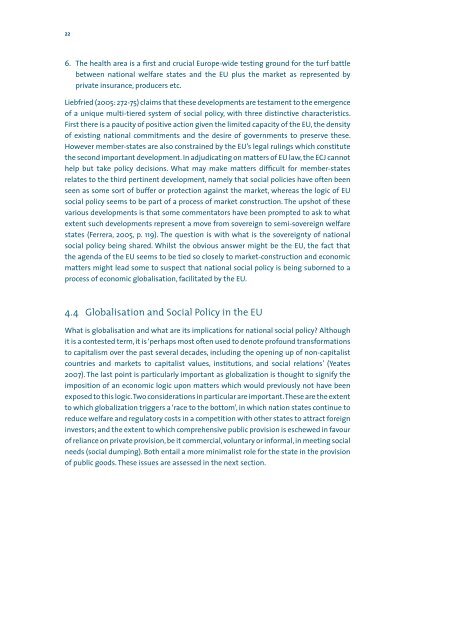4. Perspectives on the Evolution of European Social Policy
4. Perspectives on the Evolution of European Social Policy
4. Perspectives on the Evolution of European Social Policy
- No tags were found...
You also want an ePaper? Increase the reach of your titles
YUMPU automatically turns print PDFs into web optimized ePapers that Google loves.
226. The health area is a first and crucial Europe-wide testing ground for <strong>the</strong> turf battlebetween nati<strong>on</strong>al welfare states and <strong>the</strong> EU plus <strong>the</strong> market as represented byprivate insurance, producers etc.Liebfried (2005: 272-75) claims that <strong>the</strong>se developments are testament to <strong>the</strong> emergence<strong>of</strong> a unique multi-tiered system <strong>of</strong> social policy, with three distinctive characteristics.First <strong>the</strong>re is a paucity <strong>of</strong> positive acti<strong>on</strong> given <strong>the</strong> limited capacity <strong>of</strong> <strong>the</strong> EU, <strong>the</strong> density<strong>of</strong> existing nati<strong>on</strong>al commitments and <strong>the</strong> desire <strong>of</strong> governments to preserve <strong>the</strong>se.However member-states are also c<strong>on</strong>strained by <strong>the</strong> EU’s legal rulings which c<strong>on</strong>stitute<strong>the</strong> sec<strong>on</strong>d important development. In adjudicating <strong>on</strong> matters <strong>of</strong> EU law, <strong>the</strong> ECJ canno<strong>the</strong>lp but take policy decisi<strong>on</strong>s. What may make matters difficult for member-statesrelates to <strong>the</strong> third pertinent development, namely that social policies have <strong>of</strong>ten beenseen as some sort <strong>of</strong> buffer or protecti<strong>on</strong> against <strong>the</strong> market, whereas <strong>the</strong> logic <strong>of</strong> EUsocial policy seems to be part <strong>of</strong> a process <strong>of</strong> market c<strong>on</strong>structi<strong>on</strong>. The upshot <strong>of</strong> <strong>the</strong>sevarious developments is that some commentators have been prompted to ask to whatextent such developments represent a move from sovereign to semi-sovereign welfarestates (Ferrera, 2005, p. 119). The questi<strong>on</strong> is with what is <strong>the</strong> sovereignty <strong>of</strong> nati<strong>on</strong>alsocial policy being shared. Whilst <strong>the</strong> obvious answer might be <strong>the</strong> EU, <strong>the</strong> fact that<strong>the</strong> agenda <strong>of</strong> <strong>the</strong> EU seems to be tied so closely to market-c<strong>on</strong>structi<strong>on</strong> and ec<strong>on</strong>omicmatters might lead some to suspect that nati<strong>on</strong>al social policy is being suborned to aprocess <strong>of</strong> ec<strong>on</strong>omic globalisati<strong>on</strong>, facilitated by <strong>the</strong> EU.<str<strong>on</strong>g>4.</str<strong>on</strong>g>4 Globalisati<strong>on</strong> and <strong>Social</strong> <strong>Policy</strong> in <strong>the</strong> EUWhat is globalisati<strong>on</strong> and what are its implicati<strong>on</strong>s for nati<strong>on</strong>al social policy? Althoughit is a c<strong>on</strong>tested term, it is ‘perhaps most <strong>of</strong>ten used to denote pr<strong>of</strong>ound transformati<strong>on</strong>sto capitalism over <strong>the</strong> past several decades, including <strong>the</strong> opening up <strong>of</strong> n<strong>on</strong>-capitalistcountries and markets to capitalist values, instituti<strong>on</strong>s, and social relati<strong>on</strong>s’ (Yeates2007). The last point is particularly important as globalizati<strong>on</strong> is thought to signify <strong>the</strong>impositi<strong>on</strong> <strong>of</strong> an ec<strong>on</strong>omic logic up<strong>on</strong> matters which would previously not have beenexposed to this logic. Two c<strong>on</strong>siderati<strong>on</strong>s in particular are important. These are <strong>the</strong> extentto which globalizati<strong>on</strong> triggers a ‘race to <strong>the</strong> bottom’, in which nati<strong>on</strong> states c<strong>on</strong>tinue toreduce welfare and regulatory costs in a competiti<strong>on</strong> with o<strong>the</strong>r states to attract foreigninvestors; and <strong>the</strong> extent to which comprehensive public provisi<strong>on</strong> is eschewed in favour<strong>of</strong> reliance <strong>on</strong> private provisi<strong>on</strong>, be it commercial, voluntary or informal, in meeting socialneeds (social dumping). Both entail a more minimalist role for <strong>the</strong> state in <strong>the</strong> provisi<strong>on</strong><strong>of</strong> public goods. These issues are assessed in <strong>the</strong> next secti<strong>on</strong>.
















